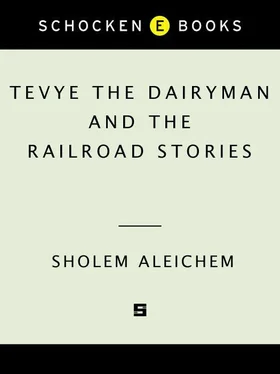In short, whether he is simply a natural democrat, or whether, staunchly traditional Jew though he is, he has unknowingly been affected by the liberal winds blowing in Russia, Tevye has fathered the daughters of his deepest dreams. Trunk puts it well when he writes of the man and his children, “Though consciously they have different outlooks on life, unconsciously they share the same sense of it.” It is only in the novel’s penultimate chapter, the story of Beilke, however, that Tevye achieves a belated insight concerning this fact, for then, seeing Beilke’s unhappiness in her stultifyingly opulent surroundings and recalling the vivacious child who lived with him in semipoverty, he articulates at last what at heart he has always known, namely, that all that really matters in life is human love, warmth, and intelligence, thus realizing the pitifulness of his one great conscious obsession: to have a rich daughter. Fate, he tragically learns, not only mocks a man by withholding his desires, but also — and sometimes most of all — by granting them. And like any tragic hero’s, Tevye’s fate, as Trunk reminds us, is his character.
But what a disproportion between the two! What a character and what a fate! Surely no man, and most surely none as good as Tevye, deserves to see his daughters stricken, as he says, by a curse worse than any in the Bible … and this conviction of injustice, the subject of Tevye’s running debate with God, forms the novel’s third and most profound level of all. Sholem Aleichem, it is true, is not often thought of as a religious writer. Religious observance, though constantly referred to in his work as part of the everyday fabric of Jewish life, does not play an especially important role in it, and genuinely spiritual figures are rare there. Indeed, this was one of the reasons that Y. L. Peretz, his leading rival among the Yiddish writers of the day and the author of much edifying fiction, dismissed Sholem Aleichem as a basically lowbrow figure who never grappled with ultimate Jewish issues. Humor in general, though by no means an illegitimate medium for serious religious expression, is not commonly put to that purpose. Yet having said all this, I would submit that Tevye the Dairyman , the comitragic historical account of the death of an ancient culture and psychological analysis of a father’s unhappy love for his daughters, is also one of the most extraordinary Jewish religious texts of our own, and perhaps of any, time.
Tevye is a God-arguer: as such he belongs in a long jewish tradition that starts with Abraham and runs prominently on through Moses, through Job, through the Tannaitic rabbi Yehoshua ben Levi (who refused to accept a heaven-backed interpretation of Scripture even though it was supported by divine miracles), through Levi Yitzchak of Berdichev, the saintly Hasidic master who is said to have held a trial at which God was the absentee defendant, accused of having inflicted undeserved suffering on His people. Other religions may have their folktales about men who debate with and even rebuke God, but only in Jewish tradition, I believe, are such stories taken with high seriousness, the behavior in question being regarded — provided, of course that it comes from a spiritually ripe individual — as the highest form of religious service. Though it is Job’s friends who keep telling him to accept God’s judgment and Job who insists that he will not because that judgment is unjust, God Himself, after finally speaking to Job from the whirlwind, turns to his friends and says, “My wrath is kindled against you … for you have not spoken of Me what was right, as My servant Job has.” And what is right, apparently, is to hold God to the highest standards of a man’s conscience, even if He does not seem to behave by them.
It is worth considering this for a moment, for it presents an oddly paradoxical alternative, and by no means the main one adopted by Judaism either, to what have commonly been the standard responses of advanced cultures to the problem of innocent suffering in the world. Basically there have been three of these:
1. God exists, is good, and is all-powerful; what appears to us His injustice is either a legitimate testing of our character, a just retribution for our sins, or an illusion created by our inability to understand the workings of the Divinity.
2. God exists, is good, but is not all-powerful; beside Him are other, evil forces that contend with and sometimes best Him, thus gaining power over the world.
3. God does not exist and suffering is the result either of blind chance or of immutable laws working themselves out in the lives of men.
The first of these answers has been the one most often given by the major monotheistic religions; the second by Manichaeism, Gnosticism, Zoroastrianism, and various other dualistic beliefs; the third by modern science and, essentially, by Buddhism.
But there is also, as we have seen, a fourth possible response: God exists; He is good; He is all-powerful; therefore He must be just; but He is not just; therefore He owes man an explanation and man must demand it from Him.
This is Job’s response. And it is also Tevye’s.
Job is not one of the religious texts that Tevye is always quoting from, nor would it be likely to be. On the whole it was not a part of Scripture widely read by East European Jews, both because it was not linked to specific prayers, rituals, or holidays like other books in the Bible, and because its Hebrew is extremely difficult. But Tevye knows its story and, in “Shprintze,” on his way home from his humiliating meeting with Ahronchik’s uncle, when it seems to him that nothing worse can happen (little does he know that he is soon to receive the most terrible blow of all), his identification with it emerges. And yet though his suffering is truly Jobian, as is his reaction to it, how much more lonely and isolated a figure he is than Job! Job has his three friends, who despite their aggravating piety are a comfort merely by their presence, and he has his God, who finally speaks to him in a blazing epiphany that rewards him for all his anguish; Tevye, however, has no one. Alone in his village, without a Jew to speak to, without a synagogue to go to, without a God to be spoken to by, he must carry on the dialogue of Job all by himself, now being Tevye demanding to know what he has been punished for, now being his comforters patiently explaining that whatever God does is for the best, and now being God Himself threatening to blow him, little Tevye, away with a puff of His breath if he does not stop his tiresome complaining. All around him the world is as silent as the forest in which he has his deepest thoughts. There is not a consoling word. Man says nothing. God says nothing. The Messiah is a policeman with an eviction notice. And Tevye, who will not take nothing for an answer, goes on arguing with them all!
Did Sholem Aleichem think of this side of Tevye in more than just comic terms? Of course he did. Listen to what his son-in-law Y. D. Berkovits has to say about him at the time he was writing “Shprintze”:
It goes without saying that none of these externals [Berkovits has been discussing Sholem Aleichem’s attitude toward Jewish religious observance] had very much to do with the inner religious feelings that existed in him and that frequently stirred him greatly. For that Sholem Aleichem had in his own way a most religiously sensitive personality — of this I have not the slightest doubt. On the table by his bed always lay a small, open Bible that he would read now and then, especially at night when he had trouble sleeping. I suspected that he was mainly reading the Book of Job, and once indeed, when he began to test me on my knowledge of it, I was astounded by his familiarity with it, especially when I thought of how hard we had found it in the schoolroom when we were young.
Читать дальше












